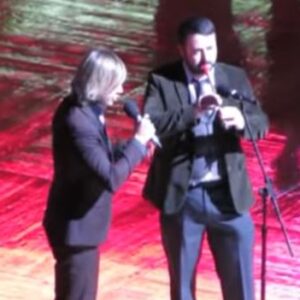When Queen released Bohemian Rhapsody in 1975, the song immediately stood apart from anything else in popular music. Written by Freddie Mercury and produced with Roy Thomas Baker, the six-minute track defied conventions, blending ballad, operatic interludes, and hard rock into a single composition. Its layered harmonies, experimental structure, and Mercury’s soaring vocal range helped it become Queen’s defining work. Despite initial doubts from radio programmers about its length and complexity, it went on to top charts worldwide and remains one of the most celebrated rock songs of all time. Covering it is a daunting task, given its technical demands and the iconic status of Mercury’s original performance.

Mickey Callisto, however, has stepped into that challenge. The Sunderland-born singer recently delivered an a cappella rendition of Bohemian Rhapsody that left audiences in awe. Performing the track without instrumentation stripped the song down to its core, making Callisto’s vocal interpretation the central focus. From the opening line, his performance showcased control, range, and an emotive quality that drew immediate comparisons to Mercury. Viewers quickly filled comment sections with calls for him to perform alongside Queen, with some saying they had never believed anyone could rival the original until hearing his version.
Callisto’s career trajectory over the past year has been rapid. Earlier in 2024, he auditioned for Britain’s Got Talent, where his unique vocal style immediately drew attention. His performance history expanded further when he fronted the viral Bohemian Rhapsody flash mob in Paris, orchestrated by pianist Julien Cohen. That event featured 30 musicians and drew international recognition after being viewed more than 500 million times online. Callisto, arriving dramatically in a white carriage, carried the performance with a vocal intensity that balanced spectacle with authenticity.

Reflecting on the Paris project, Callisto admitted it was nerve-racking given the size of the production and limited rehearsal time, but adrenaline carried him through. Since then, his opportunities have multiplied, with invitations to perform in cities like Singapore and Amsterdam. He has also attracted media attention in the UK, with presenters and viewers praising the emotional impact of his voice.
The reaction to his a cappella version, however, feels particularly significant. Without orchestration, staging, or multimedia production, Callisto’s performance placed him in direct conversation with Mercury’s legacy. While some listeners remain cautious about comparing any singer to Queen’s frontman, the widespread response highlights how effectively Callisto channels both the technical demands and the emotional spirit of Bohemian Rhapsody.
Importantly, Callisto’s approach does not come across as mimicry. His delivery respects Mercury’s phrasing while introducing subtle differences in tone and expression, suggesting an artist finding his own place within the framework of a legendary song. The combination of reverence and individuality has fueled the growing belief that he could credibly join Queen on stage, even if only for a guest performance.
Whether on talent-show stages, in public squares, or stripped down with nothing but his voice, Mickey Callisto has demonstrated an ability to connect audiences with a song that remains one of rock’s most ambitious works. His a cappella Bohemian Rhapsody may not replace the original, but it has reignited appreciation for its complexity while showcasing one of today’s most promising new vocalists.





